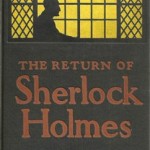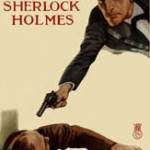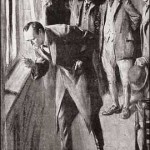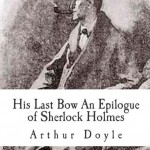“We are told that three men drank from them. Does that strike you as likely?”
“Why not? There was wine in each glass.”
“Exactly, but there was beeswing only in one glass. You must have noticed that fact. What does that suggest to your mind?”
“The last glass filled would be most likely to contain beeswing.”
“Not at all. The bottle was full of it, and it is inconceivable that the first two glasses were clear and the third heavily charged with it. There are two possible explanations, and only two. One is that after the second glass was filled the bottle was violently agitated, and so the third glass received the beeswing. That does not appear probable. No, no, I am sure that I am right.”
“What, then, do you suppose?”
“That only two glasses were used, and that the dregs of both were poured into a third glass, so as to give the false impression that three people had been here. In that way all the beeswing would be in the last glass, would it not? Yes, I am convinced that this is so. But if I have hit upon the true explanation of this one small phenomenon, then in an instant the case rises from the commonplace to the exceedingly remarkable, for it can only mean that Lady Brackenstall and her maid have deliberately lied to us, that not one word of their story is to be believed, that they have some very strong reason for covering the real criminal, and that we must construct our case for ourselves without any help from them. That is the mission which now lies before us, and here, Watson, is the Sydenham train.”
The household at the Abbey Grange were much surprised at our return, but Sherlock Holmes, finding that Stanley Hopkins had gone off to report to headquarters, took possession of the dining-room, locked the door upon the inside, and devoted himself for two hours to one of those minute and laborious investigations which form the solid basis on which his brilliant edifices of deduction were reared. Seated in a corner like an interested student who observes the demonstration of his professor, I followed every step of that remarkable research. The window, the curtains, the carpet, the chair, the rope—each in turn was minutely examined and duly pondered. The body of the unfortunate baronet had been removed, and all else remained as we had seen it in the morning. Finally, to my astonishment, Holmes climbed up on to the massive mantelpiece. Far above his head hung the few inches of red cord which were still attached to the wire. For a long time he gazed upward at it, and then in an attempt to get nearer to it he rested his knee upon a wooden bracket on the wall. This brought his hand within a few inches of the broken end of the rope, but it was not this so much as the bracket itself which seemed to engage his attention. Finally, he sprang down with an ejaculation of satisfaction.
“It’s all right, Watson,” said he. “We have got our case—one of the most remarkable in our collection. But, dear me, how slow-witted I have been, and how nearly I have committed the blunder of my lifetime! Now, I think that, with a few missing links, my chain is almost complete.”
“You have got your men?”
“Man, Watson, man. Only one, but a very formidable person. Strong as a lion—witness the blow that bent that poker! Six foot three in height, active as a squirrel, dexterous with his fingers, finally, remarkably quick-witted, for this whole ingenious story is of his concoction. Yes, Watson, we have come upon the handiwork of a very remarkable individual. And yet, in that bell-rope, he has given us a clue which should not have left us a doubt.”
“Where was the clue?”
“Well, if you were to pull down a bell-rope, Watson, where would you expect it to break? Surely at the spot where it is attached to the wire. Why should it break three inches from the top, as this one has done?”
“Because it is frayed there?”
“Exactly. This end, which we can examine, is frayed. He was cunning enough to do that with his knife. But the other end is not frayed. You could not observe that from here, but if you were on the mantelpiece you would see that it is cut clean off without any mark of fraying whatever. You can reconstruct what occurred. The man needed the rope. He would not tear it down for fear of giving the alarm by ringing the bell. What did he do? He sprang up on the mantelpiece, could not quite reach it, put his knee on the bracket—you will see the impression in the dust—and so got his knife to bear upon the cord. I could not reach the place by at least three inches—from which I infer that he is at least three inches a bigger man than I. Look at that mark upon the seat of the oaken chair! What is it?”
“Blood.”
“Undoubtedly it is blood. This alone puts the lady’s story out of court. If she were seated on the chair when the crime was done, how comes that mark? No, no, she was placed in the chair AFTER the death of her husband. I’ll wager that the black dress shows a corresponding mark to this. We have not yet met our Waterloo, Watson, but this is our Marengo, for it begins in defeat and ends in victory. I should like now to have a few words with the nurse, Theresa. We must be wary for a while, if we are to get the information which we want.”
She was an interesting person, this stern Australian nurse—taciturn, suspicious, ungracious, it took some time before Holmes’s pleasant manner and frank acceptance of all that she said thawed her into a corresponding amiability. She did not attempt to conceal her hatred for her late employer.
“Yes, sir, it is true that he threw the decanter at me. I heard him call my mistress a name, and I told him that he would not dare to speak so if her brother had been there. Then it was that he threw it at me. He might have thrown a dozen if he had but left my bonny bird alone. He was forever ill-treating her, and she too proud to complain. She will not even tell me all that he has done to her. She never told me of those marks on her arm that you saw this morning, but I know very well that they come from a stab with a hatpin. The sly devil—God forgive me that I should speak of him so, now that he is dead! But a devil he was, if ever one walked the earth. He was all honey when first we met him—only eighteen months ago, and we both feel as if it were eighteen years. She had only just arrived in London. Yes, it was her first voyage—she had never been from home before. He won her with his title and his money and his false London ways. If she made a mistake she has paid for it, if ever a woman did. What month did we meet him? Well, I tell you it was just after we arrived. We arrived in June, and it was July. They were married in January of last year. Yes, she is down in the morning-room again, and I have no doubt she will see you, but you must not ask too much of her, for she has gone through all that flesh and blood will stand.”
Lady Brackenstall was reclining on the same couch, but looked brighter than before. The maid had entered with us, and began once more to foment the bruise upon her mistress’s brow.
“I hope,” said the lady, “that you have not come to cross-examine me again?”
“No,” Holmes answered, in his gentlest voice, “I will not cause you any unnecessary trouble, Lady Brackenstall, and my whole desire is to make things easy for you, for I am convinced that you are a much-tried woman. If you will treat me as a friend and trust me, you may find that I will justify your trust.”
“What do you want me to do?”
“To tell me the truth.”
“Mr. Holmes!”
“No, no, Lady Brackenstall—it is no use. You may have heard of any little reputation which I possess. I will stake it all on the fact that your story is an absolute fabrication.”
Mistress and maid were both staring at Holmes with pale faces and frightened eyes.
“You are an impudent fellow!” cried Theresa. “Do you mean to say that my mistress has told a lie?”
Holmes rose from his chair.
“Have you nothing to tell me?”
“I have told you everything.”
“Think once more, Lady Brackenstall. Would it not be better to be frank?”
For an instant there was hesitation in her beautiful face. Then some new strong thought caused it to set like a mask.
“I have told you all I know.”
Holmes took his hat and shrugged his shoulders. “I am sorry,” he said, and without another word we left the room and the house. There was a pond in the park, and to this my friend led the way. It was frozen over, but a single hole was left for the convenience of a solitary swan. Holmes gazed at it, and then passed on to the lodge gate. There he scribbled a short note for Stanley Hopkins, and left it with the lodge-keeper.
“It may be a hit, or it may be a miss, but we are bound to do something for friend Hopkins, just to justify this second visit,” said he. “I will not quite take him into my confidence yet. I think our next scene of operations must be the shipping office of the Adelaide-Southampton line, which stands at the end of Pall Mall, if I remember right. There is a second line of steamers which connect South Australia with England, but we will draw the larger cover first.”
Holmes’s card sent in to the manager ensured instant attention, and he was not long in acquiring all the information he needed. In June of ’95, only one of their line had reached a home port. It was the ROCK OF GIBRALTAR, their largest and best boat. A reference to the passenger list showed that Miss Fraser, of Adelaide, with her maid had made the voyage in her. The boat was now somewhere south of the Suez Canal on her way to Australia. Her officers were the same as in ’95, with one exception. The first officer, Mr. Jack Crocker, had been made a captain and was to take charge of their new ship, the BASS ROCK, sailing in two days’ time from Southampton. He lived at Sydenham, but he was likely to be in that morning for instructions, if we cared to wait for him.
No, Mr. Holmes had no desire to see him, but would be glad to know more about his record and character.
His record was magnificent. There was not an officer in the fleet to touch him. As to his character, he was reliable on duty, but a wild, desperate fellow off the deck of his ship—hot-headed, excitable, but loyal, honest, and kind-hearted. That was the pith of the information with which Holmes left the office of the Adelaide-Southampton company. Thence he drove to Scotland Yard, but, instead of entering, he sat in his cab with his brows drawn down, lost in profound thought. Finally he drove round to the Charing Cross telegraph office, sent off a message, and then, at last, we made for Baker Street once more.
“No, I couldn’t do it, Watson,” said he, as we reentered our room. “Once that warrant was made out, nothing on earth would save him. Once or twice in my career I feel that I have done more real harm by my discovery of the criminal than ever he had done by his crime. I have learned caution now, and I had rather play tricks with the law of England than with my own conscience. Let us know a little more before we act.”
Before evening, we had a visit from Inspector Stanley Hopkins. Things were not going very well with him.
“I believe that you are a wizard, Mr. Holmes. I really do sometimes think that you have powers that are not human. Now, how on earth could you know that the stolen silver was at the bottom of that pond?”
“I didn’t know it.”
“But you told me to examine it.”
“You got it, then?”
“Yes, I got it.”
“I am very glad if I have helped you.”
“But you haven’t helped me. You have made the affair far more difficult. What sort of burglars are they who steal silver and then throw it into the nearest pond?”
“It was certainly rather eccentric behaviour. I was merely going on the idea that if the silver had been taken by persons who did not want it—who merely took it for a blind, as it were—then they would naturally be anxious to get rid of it.”
“But why should such an idea cross your mind?”
“Well, I thought it was possible. When they came out through the French window, there was the pond with one tempting little hole in the ice, right in front of their noses. Could there be a better hiding-place?”
“Ah, a hiding-place—that is better!” cried Stanley Hopkins. “Yes, yes, I see it all now! It was early, there were folk upon the roads, they were afraid of being seen with the silver, so they sank it in the pond, intending to return for it when the coast was clear. Excellent, Mr. Holmes—that is better than your idea of a blind.”






